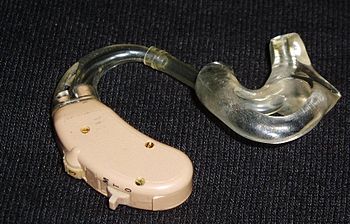| NOW HEAR THIS: The missing components Wikipedia |
That's how my tired mother-in-law's audiology appointment began as we took our seats next to a startled hearing specialist at the Princess of Wales Hospital in Ely. For those not in the know, m-in-l has Alzheimer's Disease, her husband has been dead for four years and we were at the hospital for a hearing check because she had lost her hearing aid. Ordinarily, she is confused; without the ear piece, she really is a lost soul because she has no idea what is happening around her and her tinnitus is more marked.
Understandably, a great deal goes missing when people suffer from dementia. And the problem is compounded in a home where most residents are suffering from severe memory loss. So to lose/misplace/hide a pair of spectacles or a hearing aid is not unusual, although such items frequently turn up in somebody else's room, pocket or handbag. Indeed, my wife once came across the following in one of her mum's handbags when searching for a pair of missing glasses: three pairs of tights, two pairs of knickers, a toothbrush, two tubes of toothpaste, a bar of soap, a hairbrush, chopsticks and part of old school report from way back when. No specs, but yes, it was a large handbag with a nickname: the Bermuda Triangle.
The 10-minute trip to the hospital gave no indication of the outburst outlined earlier. M-in-l had appeared pleased to see me when I picked her up from the care home and she eventually remembered my name. But she seemed extremely tired, looking even older than her 85 years.
The weather was grim, again, with strong Fenland winds and persistent rain, yet inside the car and inside her own bubble, she happily chattered away. No response to my questions, of course, because she couldn't hear, so I resorted to leaning over and yelling in her right ear to make myself heard. And even then she didn't always catch what was said.
"It's Wednesday today."
"Yes dear, it is windy."
And so on ...
We eventually found a parking space close to the hospital's main reception and managed to shuffle our way through puddles, over the pedestrian crossing to the entrance doors, as she ranted and raged about the foul day. Not quite Lear - Blow, winds, and crack your cheeks! - but her mood now certainly matched the weather as her paranoia developed.
We edged our way into a waiting area and an efficient-looking woman suddenly appeared. She had some sort of identification tag around her neck so I showed her our appointment form, enquired about audiology and she kindly pointed us in the right direction. It was a matter of eight or nine yards further on in the large waiting area, doors to rooms on all sides, with hand-written notices pinned to them. Good to see the NHS embracing modern technology. Audiology Room 101.
Fortunately, we did not have to wait. After m-in-l's initial panic, she began to realise her fears were unfounded and it was nothing more sinister than a hearing test. I was suddenly one of the good guys again and the foul day was forgotten. The test itself was by no means accurate, as the patient hearing expert was anxious to point out, and at times it descended into farce as the audiologist scribbled notes which m-in-l was unable to read, or I shouted into m-in-l's left ear in vain attempt to relay instructions.
"Just press the button when you hear any sort of noise."
"What did you say?"
"Just press the button."
"This? Press this? Why do you want me to press this?"
The test went ahead without the use of the button. Instead, the audiologist relied on m-in-l's facial expressions or her verbal reactions when she heard a sound. Later, a putty-like substance was inserted into an ear while a mould was taken.
The good news is that a new hearing aid will be fitted next week and this time the NHS will provide us with a spare. They will also retain the mould so we do not have to go through this rigmarole again.
It was trying, tiring and confusing for m-in-law, but a necessary evil because she really does suffer without a digital hearing aid. Her jumbled, confused thoughts are surely frightening enough, but to suffer in a world of silence must be awful. Please make some sort of donation to the Alzheimer's cause.
UPDATE: The hearing aid fitting at the Prince of Wales Hospital went smoothly. No waiting, no fuss and no consternation from m-in-l. Sadly, she had a toilet accident on the way home but she was completely unaware and the brilliant staff at The Firs home swiftly sorted her out on her return. Thankfully, her hearing problems have now eased and we can converse again; sadly, the Alzheimer's continues unabated.
"Did I tell you I visited my mother last week?" she asked, referring to a women who died more than 40 years ago. "Yes, she's keeping well."
At least her mood seemed to match the weather on this pleasant, sunny, February day in the Fens.
NB: Please remember that by clicking on the adverts on this blog you are helping to make a contribution towards Alzheimer's research (see previous posts). So get clicking ...

